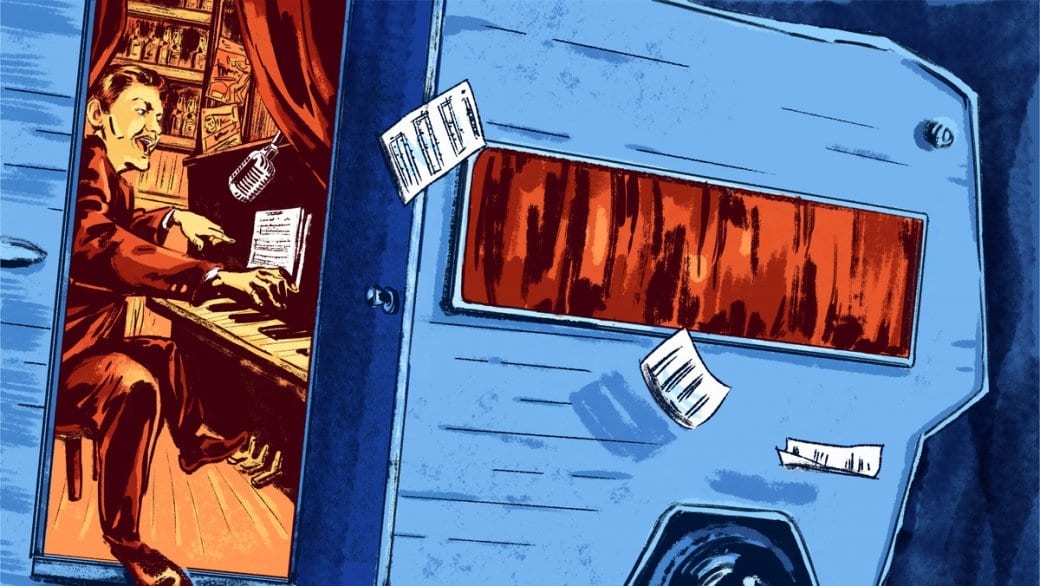Jazz musician Billy Tipton was born with another name, but Billy is the name he chose. Tipton was assigned female at birth, but he identified as a man for most of his life.
Tipton decided to make a serious go of a career in music in the 1930s. Perhaps after meeting resistance when he performed as a woman, he started to perform as a man. He took the name Billy (his father’s nickname), bound his breasts and padded his groin. It looks like this did the trick.
When Tipton hit the scene, jazz was blaring on radios all across America. In the ’30s and ’40s, he toured in various bands, sometimes on the piano, sometimes playing the saxophone and sometimes as the bandleader. He was even in a band that performed with The Ink Spots (think The Shawshank Redemption soundtrack).
With Billy Tipton on piano, wearing a white dinner jacket and with his hair slicked back, The Billy Tipton Trio eventually became a hit. The group recorded two albums of jazz standards in 1957 — Sweet Georgia Brown and Billy Tipton Plays Hi-Fi on Piano.
“Sweet Georgia Brown,” performed by The Billy Tipton Trio in 1955.
Timmybear/YouTube
He could have become even more famous, but turned down some impressive job offers in favour of low-profile gigs in Spokane, Washington. He retired from music in the mid 1970s.
From about 1940 onward, he lived as a man offstage as well as onstage. Over the course of his life, very few people would find out that he was transgender. He had a series of long-term relationships with women and it appears that most, if not all, were unaware of the fact.
He told at least some of his partners that his genitals looked the way they did, because he had been injured in a car accident. He claimed he bound his chest to protect ribs that were broken in the same accident.
In about 1960, he started a relationship with a nightclub dancer named Kathleen “Kitty” Kelly, who performed — much to my amusement — under the name The Irish Venus. Together they adopted three boys — John, Scott and William — and Tipton was, by all accounts, a good father, a devoted husband and a gentleman.
When they split up around 1979, the cash-strapped Tipton and his sons moved into a mobile home. That’s where he would die in January 1989, at age 74, of an untreated ulcer (Tipton avoided medical examinations) that had hemorrhaged.
When he died, his secret got out. Either the paramedics (or perhaps the coroner, or both) made the discovery, and revealed it to his family (even his kids didn’t know up to that point), and then the papers found out.
A February 1989 People Magazine article, odiously titled “Death Discloses Billy Tipton’s Strange Secret: He Was a She,” refers to his life — his identity — as a “masquerade.” It says that when he died, Tipton was “found to be not quite the perfect gentleman. In fact, he was a woman.”
Other obituaries I’ve found are no better — they misgender him (refer to him as the wrong gender) and treat him like an oddity to be mocked, rather than a man to be mourned.
The memory of Tipton is kicked around less and less as the years go by, but he has still been repeatedly misgendered and “dead named” (calling a transgender person by their birth name rather than chosen name) and had his relationship to his sons devalued.
Even Lillian Faderman’s otherwise masterful 1991 book, Odd Girls and Twilight Lovers: A History of Lesbian Life in Twentieth-Century America, refers to Tipton as a woman. He’s also referred to as “she” in Diane Middlebrook’s 1998 book, Suits Me: The Double Life of Billy Tipton.
Some have propped up their use of female pronouns with the argument that Tipton identified as male only in order to make it in the male-dominated jazz industry of the 1930s and 1940s, and that therefore he wasn’t actually transgender. Well, maybe he did, and maybe he didn’t. It’s not for us to judge his motives, but to respect his stated gender identity.
As we go forward, I hope to see more and better works on this man’s interesting life, and I certainly hope the world’s gotten to the point where we can show him proper respect by acknowledging his chosen identity.
History Boys appears on Daily Xtra on the first and third Tuesday of every month. You can also follow them on Facebook.


 Why you can trust Xtra
Why you can trust Xtra


